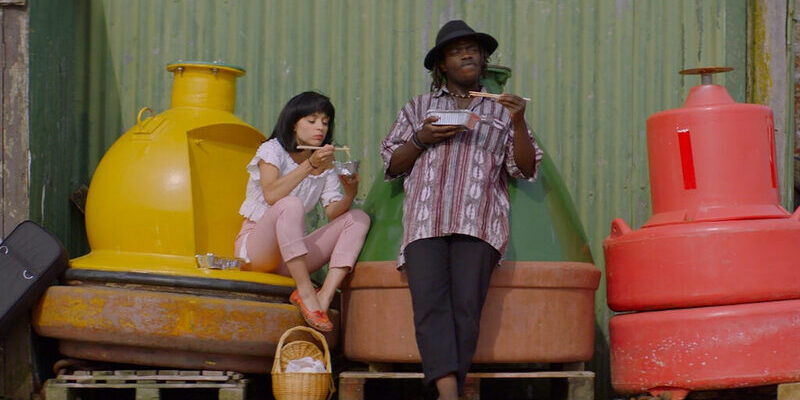
Review by
Eric Hillis
Directed by: Ben Bond
Starring: Jonathan Ajayi, Lucie Bourdeu, Jonjo O'Neill, Joey Akubeze, Tom Sweet

Sometimes a movie wins you over in spite of itself/yourself. With its
forced French New Wave affectations and tone deaf racial politics,
writer/director Ben Bond's feature debut
The Drifters tried its best to wind me up. But despite its
best efforts to rub me the wrong way, I ultimately found it a breezy
diversion thanks to the charm of its young leads.

As our heroes, Fanny and Koffee, Lucie Bourdeu and
Jonathan Ajayi are magnetic, managing to make something of
characters that are little more than crudely drawn stereotypes. Fanny is
a pretty French immigrant to London who works as a waitress and enjoys a
carefree existence. Koffee is a refugee from an unnamed war-torn African
nation, living illegally in the UK and working for a ruthless mobster
who promises him the ultimate reward of an Irish passport when he's
worked off his debt by running a car wash and engaging in jewellery
store heists.
The pair have a meet cute when they're asked to perform a role play in
their English class and quickly hit it off. When Koffee steals his
boss's gun, car and Irish passport, he needs to go into hiding and so
invites Fanny for a trip to the south coast. Over a sunny weekend, the
pair take in the sights, engage in some petty criminality and fall in
love.

From its pre-credits sequence, in which Fanny breaks the fourth wall
and reels off her nonchalant personal philosophy,
The Drifters attempts to pay tribute to 1960s Godard in
cringey fashion. Taking Pierrot le Fou as its model,
Bond's film gives us an attractive young couple on the run, whom he
gratingly uses as a mouthpiece on a variety of what seem to be personal
bugbears, from Brexit to the state of modern TV commercials. But what
was revolutionary in 1965 now comes off as crass and cheesy.
It doesn't help that Bond's liberal politics are in contrast to the
tone deaf portrayal of his foreign protagonists. The gamine Fanny
couldn't be more of a French stereotype if she wore a string of garlic
around her neck, and with her constant movie references she feels like
she's been created in a lab by some horny male film student. Koffee is
treated as a unicorn by both the film and Fanny, who despite hailing
from Paris, acts as though he's the first Black person she's ever met.
"Where you a child soldier?" and "Do Black people swim?" are among her
face-palming queries.

And yet for all of the above, I frequently found myself settling into
The Drifters' easy-going rhythm. Maybe it's because at time of writing my
government has forbidden me from exiting a five km radius of my
residence, but just hanging out in a seaside town for 90 minutes felt
like something of a tonic for the soul. Despite how crudely sketched
their characters are, Bourdeu and Ajayi are genuine talents and share an
affecting chemistry. When they're not trying to be Karina and Belmondo
they almost feel like real people, and had the movie dropped its New
Wave posturing and erased its pointless criminal subplot, it might have
functioned as a genuinely charming tale of young love.


